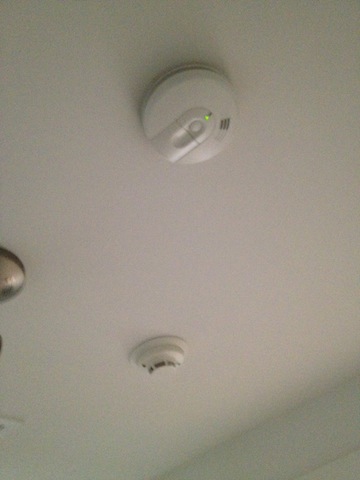OK so I have a typical belt and suspenders fire set-up that is I suspect driven by code.
4 120V Firex FCAD ionization smoke alarms, interconnected & unmonitored
4 System Sensor 4W-B photoelectric smoke alarms, monitored, and connected to 2 heat alarms in the garage and plant room.

I am updating my alarm to an ELK M1 (currently and NX-8). Here's what happens every time.
1) The ionisation alarm goes off with cooking.
2) My wife gets in a panic and goes to the alarm keypad to shut it off
3) Alarm keypad doesn't cancel the alarm as it is connected to the second low voltage photoelectric alarms only - in fact she usually sets the alarm by accident when she plugs her code in.
4) Baby wakes up screaming
5) She panics again thinking that the fire brigade is coming
6) She madly fans the alarm while calling me on the phone
This is a very human situation that I'd like to improve with the technology I have at my finger tips without sacrificing safety.
1) I'd like to be able to silence the alarms at the keypad - they are high up and hard to reach the silence button with a pole.
2) I'd like for all smoke alarms to report to my HA system so I can be alerted and to silence them remotely if needed.
I know how to do these things with the elk + my HA system, but the unmonitored 120V smokes are the problem here. I have read the debates about people switching out their 120V smokes with the photoelectric GE350CX, but the advantage I have in my set-up I suppose is having dual photoelectric and ionisation alarms together for greater safety/redundancy.
- disconnect the 120V smokes altogether, but keep them for code purposes?
- replace them with monitored 120V photoelectric smokes? (if these even exist?)
- do nothing and educate my wife
I kind of hate the sensitivity of the Firex FCAD ionization alarms - they seem to produce a lot more false alarms vs. the System Sensor 4W-B's. They often go off in the spring at times of high humidity here in Texas too.
I'd love to get a better designed set-up that was more human-friendly.
4 120V Firex FCAD ionization smoke alarms, interconnected & unmonitored
4 System Sensor 4W-B photoelectric smoke alarms, monitored, and connected to 2 heat alarms in the garage and plant room.

I am updating my alarm to an ELK M1 (currently and NX-8). Here's what happens every time.
1) The ionisation alarm goes off with cooking.
2) My wife gets in a panic and goes to the alarm keypad to shut it off
3) Alarm keypad doesn't cancel the alarm as it is connected to the second low voltage photoelectric alarms only - in fact she usually sets the alarm by accident when she plugs her code in.
4) Baby wakes up screaming
5) She panics again thinking that the fire brigade is coming
6) She madly fans the alarm while calling me on the phone
This is a very human situation that I'd like to improve with the technology I have at my finger tips without sacrificing safety.
1) I'd like to be able to silence the alarms at the keypad - they are high up and hard to reach the silence button with a pole.
2) I'd like for all smoke alarms to report to my HA system so I can be alerted and to silence them remotely if needed.
I know how to do these things with the elk + my HA system, but the unmonitored 120V smokes are the problem here. I have read the debates about people switching out their 120V smokes with the photoelectric GE350CX, but the advantage I have in my set-up I suppose is having dual photoelectric and ionisation alarms together for greater safety/redundancy.
- disconnect the 120V smokes altogether, but keep them for code purposes?
- replace them with monitored 120V photoelectric smokes? (if these even exist?)
- do nothing and educate my wife
I kind of hate the sensitivity of the Firex FCAD ionization alarms - they seem to produce a lot more false alarms vs. the System Sensor 4W-B's. They often go off in the spring at times of high humidity here in Texas too.
I'd love to get a better designed set-up that was more human-friendly.
